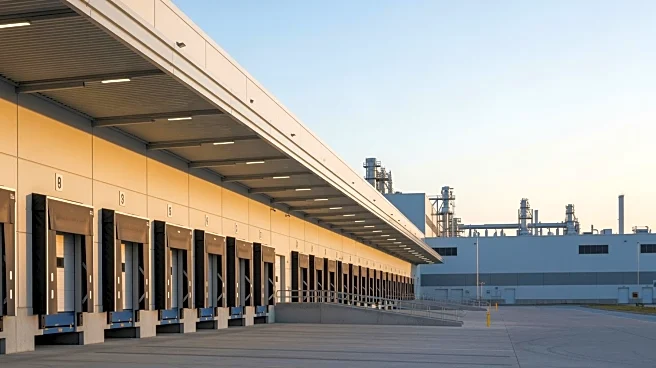What's Happening?
Prologis, a San Francisco-based real estate investment trust company, has reported an inflection point in logistics real estate demand according to its Industrial Business Indicator (IBI). The third quarter
IBI Activity Index reading was 53, indicating improved demand driven by net absorption, new lease signings, and a healthier proposal pipeline compared to the 2024 average. This growth is attributed to large and e-commerce companies, with essential industries such as food, beverage, e-commerce, and healthcare leading the way. Prologis signed a record leasing volume and more build-to-suit agreements in Q3, with utilization rates trending higher as customers expand within existing footprints. The report also noted a stabilizing market environment with vacancy rates expected to remain at mid-7% in the near-term, and a shrinking construction pipeline with new development starts below the 2017-2019 average.
Why It's Important?
The reported inflection point in logistics real estate demand signifies a potential shift in the commercial real estate sector, particularly in warehousing and logistics. This development is crucial for industries reliant on efficient supply chains, such as e-commerce and healthcare, as it suggests improved operational conditions and favorable leasing terms. The stabilization of vacancy rates and the tightening construction pipeline could lead to increased rent growth as demand improves and new space becomes scarce. This trend may benefit real estate investors and companies looking to expand their logistics operations, while posing challenges for those dependent on speculative construction and new developments.
What's Next?
As the market stabilizes, Prologis anticipates that vacancy rates will hold steady while the construction pipeline continues to tighten. This could set the stage for the market to tighten further once new supply is absorbed, particularly for modern, well-located facilities. With replacement costs remaining high, rent growth may reaccelerate as demand improves and new space becomes scarce. Companies may need to manage inventories carefully due to economic uncertainty and high holding costs, potentially leading to a rebuilding of inventory buffers as the cycle turns toward expansion.
Beyond the Headlines
The cyclical nature of the logistics real estate demand suggests that companies are managing inventories cautiously due to economic uncertainty and high holding costs. As the market conditions improve, there may be a shift towards maintaining more stock on hand to mitigate supply chain disruptions. This could lead to long-term changes in inventory management strategies and increased investment in logistics infrastructure.









